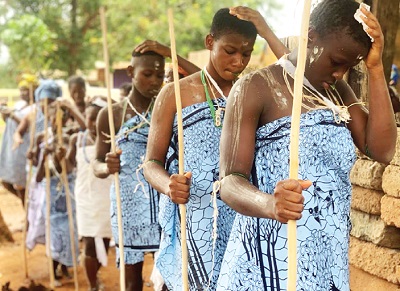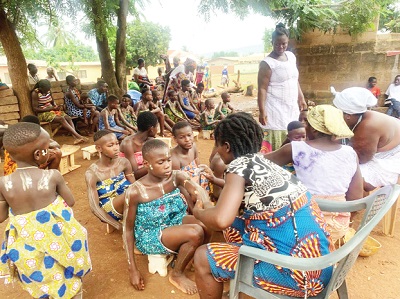Lack of virgins frustrates Dipo rites
 Lack of virgins frustrates Dipo rites
Lack of virgins frustrates Dipo rites
Mothers in charge of Dipo ( puberty rites) at Dodowa in the Shai Osudoku District in the Greater Accra Region are now allowing non-virgins to take part in the rites because it is becoming difficult to get virgin adolescent girls.
However, girls who have had abortions, given birth or carried pregnancies are still not allowed to go through the rites.
Dipo rites
According to them, many girls were now sexually active, leaving them with no choice but to allow “non-virgins” to take part in the rites.
The modification, they believe, will attract more adolescent girls to the rites which in the past were to usher only virgin girls between the ages of 10 and 15 into puberty or womanhood.
The mothers shared their concern when The Mirror team visited the Dipo House at Dodowa to witness this year’s ceremony.
The mothers are the elderly traditional women ensuring that the Dipo rites are performed.
Lack of interest
The mothers who were in their 80s, said they were unhappy that the current generation was not interested in learning the processes of the rites.
Their fear is that, in the event where they all pass away, there will be no one to replace them to perform the rites for the girls in the community.
SEE THIS: Stroke cases rising among young people
Ushering this reporter into the Dipo house, one of the mothers asked: Do you see any deity here?
There were 30 girls wearing various types of beads which covered their nakedness.
The old woman said people had a lot of misconceptions which destroyed “the beauty and essence of our culture. And because of that no one wants to come to us and learn.”

The leader of the “mothers, Awunye Ashiakie, who has been involved in Dipo rites for the past 60 years, said she started assisting older women when she was 20 years old.
She explained that although she prepared over 100 girls for the puberty rites each year, the number was still small as compared to the past.
She attributed the low patronage to modernity ,particularly education, the introduction of new media as well as influence from some pastors.
Awunye Ashaikie’s main worry was about the activities of some religious leaders who saw the puberty rites as an evil doctrine.
Another mother, Maameo, said the decline in virginity affected the numbers such that if they continued to stick to only virgins, Dipo rites would soon fade out.
Modification
Asked whether Dipo had outgrown its usefulness and should be cancelled, they all retorted loudly, “y3 ntwa mu,” to wit “we will never cancel it.”
Awunye Ashaikie who seemed very resolved to preserve Dipo said: “Dipo means “nhyira” in Akan which means blessings and “yo” in Ga and Krobo means a woman, so it is all about asking God’s blessings for the girl and so when we say “Dipo yo”, that is what we mean.
“It is the misconception people peddle around that is preventing others from bringing their daughters. I have heard people say you will not give birth or get married when you go through it and that is false,” she said.
Although Dipo is popular, it is one of the criticised traditional practices in the country.
The Mirror observed, however, that it attracted many tourists.
Dipo is celebrated by a few Dangme groups, namely the Shai and the Krobo in the Eastern Region, and it is held in the month of April.
Some community members told The Mirror that the mothers made the announcement of the dates for the rites and parents sent their girls to take part.
Unlike the past where the girls were lined up bare-chested and almost naked, this reporter observed that that was no longer the case. Girls who exposed their breasts were those who wanted to take photographs to portray the rites as done in the past.
This reporter saw that as part of the changes, girls as young as two years of age were allowed to go through the rites.

There were girls whose mothers brought them without the consent of their fathers and so such girls refused to shave their hair so they could go home quietly with no traces of the rites.
Girls who refused to shave their hair as the rites demanded paid a penalty of GH¢5 to the mothers.
Currently, to enable a girl to go through the rites, parents are supposed to pay GH¢500.00 to the mothers.
Preparation
The girls are camped in the Dipo house for a week and are given a ritual bath, taught some cooking skills, housekeeping roles and personal grooming.
They are also taught the Dipo dance which is called ‘’klama’’. The girls perform the dance all through the rites.
The kind of beads being used by the girls are those hardly seen on the market and this made each girl look unique and beautiful.
Parents of these girls were there to support them. It was exciting to see fathers cheering their daughters on.
A resident, Mr David Tetteh, said: “the men are always supportive and that’s because we practise the patrilineal system”.
Another resident, Papao Djabletey, said: “the white people come here to witness and I know that if this was their culture, we would have gone all the way there to pay and enjoy.”
Sexual orientation
Asked whether it was true that the girls were taught how to please their future partners sexually, Awunye Ashaikie laughed and said there were a lot of misconceptions out there; “3y3 ahoseasie k3k3,” that is to say, it is solely good grooming.
Importance of dipo rites
She said the rites prevented girls from being teenage mothers, contracting sexually transmitted diseases and helped them to remain chaste and develop properly.
“When you know that you have to do this before involving yourself with a man then you will wait. Dipo serves as a waiting period,” she said.
The Stone
The crux of the rites is when the girls are made to sit on a stone which was believed to determine virginity in the past.
No girl who had sat on the stone had seen how it looked as they were made to close their eyes.
The Mirror witnessed that as soon as the girls stepped out of the stone enclosure, parents ran as a sign of victory to carry their daughters and rushed out of the area.
Awunye Ashaikie explained that the stone served as a stool for kings in the olden days because there were no proper stools, adding that their forefathers brought the stone with them during their migration to their present place.
“So when the girls sit on it, they receive blessings from our ancestors. They become “oheneba”, that is, the daughter of a king. Nothing evil goes in there. You saw us entering, did you see us going in with anything?” she asked.
She said girls who did not go through the rites could neither be queenmothers nor serve the community.
Girls who went through the rites received a mark on their hands as a sign of participation, she said.
Tourism enthusiast
A tourism enthusiast and owner of Gaze Park and Eatery in Tamale, Ms Hamda Salifu, said it was important for the tourism ministry to brand Dipo rites into a grand festival that would put the nation on the international market to facilitate development.
According to her, it was a beautiful cultural practice that already attracted tourists across the globe, “so all we need to do is to market it extensively to attract more people.”



 Lack of virgins frustrates Dipo rites
Lack of virgins frustrates Dipo rites

